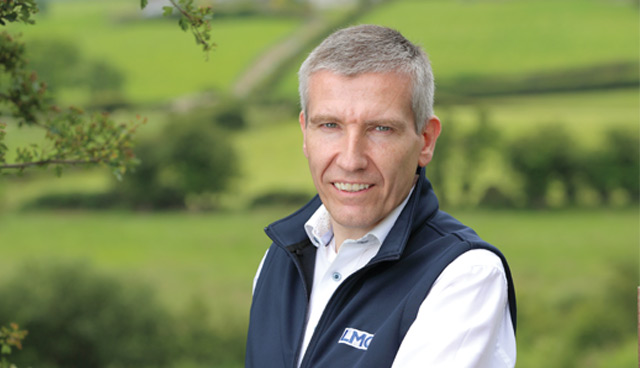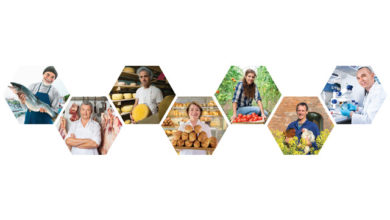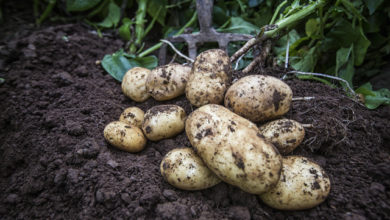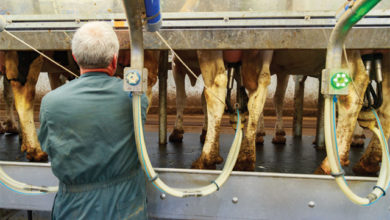Brexit has not blown over red meat industry

Transition may augur little obvious change, but a spectre remains over the livestock and meat industry as a comprehensive free trade agreement appears to be a difficult task, writes Ian Stevenson, Chief Executive of the Livestock and Meat Commission (LMC).
The last 12 months have been somewhat of a rollercoaster for the beef and sheep sector in Northern Ireland with plenty of up and down moments and sudden twists and turns to contend with. On the upside a no deal exit of the UK from the EU was avoided, China agreed to the resumption of beef exports from the UK and a new Executive was formed at Stormont. On the downside uncertainty was massively impactful on strategic investment decisions by industry, on consumer confidence and on supply chain returns to both processors and farmers.
What dominated most industry conversations during 2019 was Brexit and the implications that it was likely to have for the beef and sheep sector going forward. On two occasions, firstly in March and then again in October the very real prospect of the UK exiting the EU without a withdrawal agreement created huge amounts of anxiety for industry as no deal contingency planning was ramped up by government departments.
Farmers and processors were left with very difficult decisions to take about when and where to market their produce, what access they were going to have to certain markets after each of these so-called Brexit deadlines and whether to incur the expense of stock piling essential raw materials and finished products. In the end the rollercoaster ride of UK politics delivered a new government in Westminster and a withdrawal agreement with the EU which has seen the UK becoming a third country on 31 January 2020.
Whilst the transition arrangements have now come into effect and there will be little obvious change in the working relationship with the EU until the end of December 2020, there is still the spectre hanging over industry that a comprehensive free trade agreement will be extremely difficult to get negotiated, ratified and in place for the beginning of 2021.
One of the great uniting factors in such a divisive issue as Brexit is that almost every industry representative organisation and sector of industry have been totally united in their opposition to a no deal exit from the EU and the need for businesses to continue to have as free and frictionless trade as is possible within the UK and with the European Union.
The beef and sheep meat industry in Northern Ireland is heavily dependent on external sales with Great Britain and on export sales to the EU. About 20 per cent of our beef and 75 per cent of our lamb is sold to EU markets, which provide an important balancing outlet for all components of the carcase which cannot easily be sold in domestic markets. In such a low margin industry as beef and sheep production and processing, any additional costs associated with friction and tariffs will be hugely impactful on supply chains and the financial returns from such markets.
There has been a lot of conversation about ‘global Britain’ and the prospects of the UK striking its own trade deals with international partners such as USA, Australia and New Zealand. From a red meat perspective, the UK is not self-sufficient in production versus consumption and it imports significant volumes of beef and lamb from countries adhering to or deemed equivalent to the EU requirements on standards. A big concern that continues to be aired by industry representatives is what current standards the UK will potentially be prepared to drop in the interests of quickly negotiating new trade agreements around the world. Delegates at the recent Oxford Farming Conference were not convinced by the words of the DEFRA Secretary that UK food standards will not be imperilled for the sake of getting sign off on new trade deals.
As we come into the spring of 2020 there is a lot of work to be done to prepare the red meat industry for life outside the EU once the transition period ends.
Standards are important to our food and farming sectors in Northern Ireland as customers of industry can take comfort in the safety, quality, traceability, animal welfare and sustainability credentials of the produce they are buying. As an organisation which promotes the beef and lamb sector and its products, and operates an independently accredited beef and lamb farm quality assurance scheme for 12,000 beef and sheep farmers, LMC is acutely aware of the value and trust which customers and end consumers place on our high standards which operate throughout the entire supply chain from feed to plate.
As we come in to the spring of 2020 there is a lot of work to be done to prepare the red meat industry for life outside the EU once the transition period ends. At farm level, a new agriculture policy needs to be developed in Northern Ireland which supports a sustainable and profitable beef and sheep sector across every land type and geographic area. We are immensely proud of our farm family structure in Northern Ireland which underpins our rural communities and the rural economy and provides society with so much in terms of quality food, culture, environment and a countryside to be enjoyed. The new Executive at Stormont must play a key role in actively working with industry to design and implement a new policy that is tailored to the specific needs of Northern Ireland agriculture and that continues to attract adequate resource from government in Westminster.
At consumer level 2019 was a particularly challenging year for meat consumption levels in UK and EU markets. Consumer confidence was no doubt heavily dented by the economic uncertainty of Brexit. An increased supply of meat from domestic producers in the UK also added to significant downward price pressures in the UK market especially for meat cuts such as steaks and round cuts. This pressure on margins led to much talk of support measures being needed to help see farmers through an impending crisis. As supplies of cattle started to tighten towards the end of 2019, prices at farm gate started to rise and entering 2020 Northern Ireland farm gate prices for beef cattle were on a par with Great Britain.
Whilst Brexit will remain an on-going issue for the months and no doubt years to come there are other big issues that the industry must also engage with in the year ahead. There are many challenges ahead with an almost relentless focus on livestock’s contribution to climate change, red meat’s place in the diet and health of populations and a seemingly growing movement towards veganism and meat alternatives. The meat, milk and livestock industry must grasp the opportunity to change the narrative to one which tells the true and positive story about our industry and its products and its value to society and the environment.
The world population is growing in number and in prosperity, and with African Swine Fever taking out huge swathes of pig production in the Asian region, we have an excellent opportunity to play our part in servicing a growing demand for our sustainable grass based beef and lamb to discerning consumers at home and abroad.





